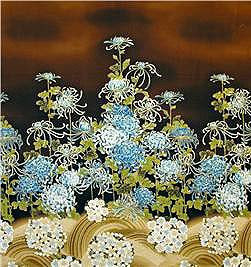Story from the Easton Courier
Polly Edwards has been sewing since she was a young girl. She liked nice clothes while growing up but money was tight, so her mother told her she would supply the fabric as long as her daughter put in the effort.
 “I loved sewing — working with fabric,” said Edwards, noting her family had a good friend who owned a dress shop. When she would finish one project, her mother would buy the fabric for the next one.
“I loved sewing — working with fabric,” said Edwards, noting her family had a good friend who owned a dress shop. When she would finish one project, her mother would buy the fabric for the next one.
Later, when pregnant with her first child, Edwards took up quilting. It’s a hobby she has continued to pursue in the decades since.
Edwards is a member of Fiber Hearts, a local women’s organization for quilters, knitters, sewers and others who work with the fiber arts. The group frequently makes items for charitable causes.
An exhibit of work by Fiber Hearts members runs through May 12 at the Easton Public Library. A public reception will take place Saturday, April 25, from noon to 3. Visitors may talk to the quilters about their work and the causes they support.
Fiber Hearts has about 15 active members and meets twice a month at the library. They make patchwork quilts and hooked rugs, they knit, they cross stitch, and they work on alternative crafts. They also like each other’s company.
“We’re just a laid-back group of women that enjoys getting together,” said Edwards, who helped start the group in 2003.
“It’s almost like an old-fashioned quilting bee,” Fiber Hearts member Cheryl Everett said of their meetings. “You talk about your kids, your family and your quilting patterns.”
Kristin Everett, Cheryl’s daughter and the group’s youngest member, started making quilts when she was in college. She then taught many of her college friends how to quilt.
After Hurricane Katrina in 2005, she and her college pals made quilts to send to people in need in New Orleans.
Her older sister, Liz Steese, also belongs to Fiber Hearts. The group made a quilt to give to Steese as a surprise gift for her wedding. That quilt is part of the library exhibit.
Cheryl Everett has sewed since a young age as well. She makes quilts for her home and to give as gifts.
Many of the group’s members learned about quilting and quilting fabrics from Edwards, who has taught personal enrichment classes at Easton schools and the library.
After meeting in the classes, the women decided they would get together regularly. They soon were making quilts for nonprofit organizations, donating them to hospitals for children with cancer and other causes. They also have sent care packages to U.S. troops overseas and to children in Africa.
Kristin Everett said many people are interested in quilting but don’t how to start. It’s also not an inexpensive hobby. Edwards likes to teach friends so they may make gifts for their children or relatives.
The women work mostly with wool, flannel and cotton quilting fabrics. They usually start with a design idea that comes from a photograph they see, a pattern they like, or from a quilting book, magazine or online site.
The basic ingredients for quilting are fabric, a sewing machine, quilting tools such as scissors and cutting devices, quilting thread — and time.
Quilting is not a quick process. “You don’t end up with a product in a day,” Edwards said. “I’ve taken from a week to five years to finish things. I never have one project going at one time.”
Kristen Everett said deadlines like birthdays, wedding showers and holidays are great motivators to finish projects.
The inside of quilts are filled with “batting” to make them warm. “It’s called sandwiching,” Edwards said of the two layers of fabric and the one layer of batting in between.
The women like to go to quilt shows together, and often take trips to a vacation home in Vermont to spend time quilting and visiting quilting and fabric shops.
“We all bring our sewing machines,” Kristin Everett said. “We only stop sewing to eat.”
Edwards agreed with that description. “We basically sit in our pajamas and sew,” she said.
On their last trip, the women made 45 pillowcases to be given to ill children.
Edwards worries quilting could become a lost art in the United States. Items may be made much cheaper elsewhere, such as China, and sold for as little as $40 at mass retailers. “The U.S. can’t compete,” she said.
Cheryl Everett thinks quilting will be around for a long time “It seems to be getting more popular,” she said. “All the high-tech tools, such as computerized sewing machines and new cutting devices, make it easier.”
Despite that, she still is hanging on to her mother’s non-electric treadle sewing machine that must be pumped by foot.
She hasn’t used the old machine in 20 years because it needs a belt, but it reminds her of a simpler time. Her mother had been a seamstress at a Bridgeport factory.
“I can remember seeing rows and rows of sewing machines at the factory,” Cheryl Edwards said.
